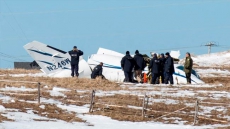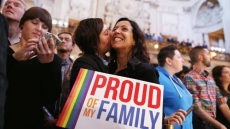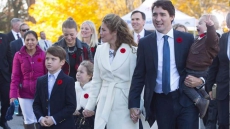VANCOUVER — A group of severely wounded military veterans claimed a victory in its years-long battle for better benefits from the Canadian government, which they accuse of treating them differently than soldiers from earlier wars.
Justice Harvey Groberman of British Columbia Appeal Court said on Friday the court will consider whether to take into account contradictions between the government's current legal position and the stand the federal Liberals took during the election.
In court documents the government says it does not owe an "extraordinary obligation" to modern-day veterans, but Veterans Affairs Minister Kent Hehr reaffirmed in a news release on Friday the government's electoral promise to uphold Canada's "sacred obligation." The Trudeau government's position in court was initially held by the Conservative government before the Tories changed their stance in December 2014 after a public backlash.
Don Sorochan, the lawyer representing the veterans, told the court the federal government shouldn't be allowed to adopt a position it previously abandoned, especially after passing a unanimous resolution last year affirming Canada's "moral, social, legal and fiduciary" duty to its injured and disabled military members.
The federal government's move to revert back to its 2014 stance amounts to an abuse of process in the courts, he said.
"You can't have politicians going around making promises and then saying they don't mean it" when it comes to constitutional obligations around Canada's "sacred covenant" with soldiers, Sorochan said outside court.
He described the sacred, or social, covenant as the long-standing obligation the country has to citizens who fought on its behalf and contributed to "the independent and free Canada we now enjoy."
The initial legal action was launched in B.C. Supreme Court in 2012 by six severely disabled veterans over changes made to their compensation six years earlier.

The federal government replaced lifelong pensions with lump-sum payments, upsetting veterans, who argued they deserved disability payments on par with workers' compensation.
Efforts by the federal government to have the case thrown out were dismissed, which led to an appeal. Last June, the lawsuit was put on hold while the parties agreed to wait and see whether new legislation and a federal election would allow for an out-of-court resolution.
The deadline for a decision passed last month, prompting the government to file documents on Monday saying the 2014 arguments "accurately reflect the current position of the federal government.''
The unexpected move stoked outrage from the veterans community.
Nineteen-year veteran Brian McKenna was in the courtroom during Friday's proceedings and later expressed dismay about the state of the ongoing legal battle.
"We finally thought we were getting somewhere a year ago, where we could avoid this process. But here we are again," he said outside court.
"You're going to have a very hard time finding any veteran who enjoys suing their country," he added. "They serve their country. They don't want to have to litigate against it."
A decision from the B.C. Appeal Court isn't expected until after the summer.





